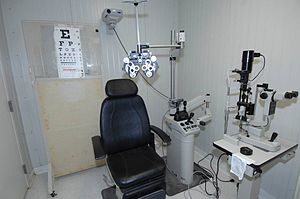Eye care in Ghana
Eye care in Ghana refers to the range of services and practices aimed at maintaining eye health and treating eye conditions in the West African country of Ghana. Eye care encompasses a variety of services including vision screening, diagnosis and treatment of eye diseases, surgical interventions, and the provision of eyeglasses and contact lenses to correct refractive errors. The eye care system in Ghana faces several challenges, including limited access to services, especially in rural areas, and a shortage of trained eye care professionals.
Overview[edit | edit source]
Eye health services in Ghana are provided by a mix of public and private healthcare facilities. The public health system includes teaching hospitals, regional hospitals, and district hospitals, all of which offer some level of eye care services. Additionally, there are specialized eye clinics and hospitals that provide comprehensive eye care services. The private sector includes a range of providers from individual ophthalmologists and optometrists to private eye clinics and hospitals.
Challenges[edit | edit source]
One of the major challenges facing eye care in Ghana is the uneven distribution of services, with a significant majority of eye care professionals based in urban areas, leaving rural populations underserved. This urban-rural divide contributes to disparities in access to eye care services. Furthermore, there is a general lack of awareness about eye health and preventive measures among the Ghanaian population, which leads to late presentations of eye conditions, making treatment more difficult and less effective.
Another significant challenge is the shortage of trained eye care professionals, including ophthalmologists, optometrists, and ophthalmic nurses. This shortage limits the capacity of the healthcare system to provide comprehensive eye care services to the growing population.
Initiatives[edit | edit source]
To address these challenges, several initiatives have been undertaken by the Ghanaian government and non-governmental organizations (NGOs). These initiatives aim to improve access to eye care services, especially in rural areas, and to increase public awareness about eye health. Examples include the National Eye Care Programme, which focuses on the prevention and control of major blinding eye diseases, and the training of mid-level eye care personnel to work in underserved areas.
Prevalent Eye Conditions[edit | edit source]
Common eye conditions in Ghana include refractive errors, cataract, glaucoma, and trachoma. Refractive errors are the most common cause of vision impairment, but they can be easily corrected with eyeglasses or contact lenses. Cataract remains the leading cause of blindness, despite being treatable with surgery. Glaucoma, often referred to as the "silent thief of sight," is a major concern due to its asymptomatic nature in the early stages and the permanent vision loss it can cause. Trachoma, although less common, still affects certain rural communities and can lead to blindness if not treated.
Conclusion[edit | edit source]
Eye care in Ghana has seen improvements over the years, but significant challenges remain. Addressing these challenges requires a multi-faceted approach that includes increasing the number of trained eye care professionals, improving access to eye care services across the country, and enhancing public awareness about eye health and preventive practices. With continued efforts from the government, NGOs, and the international community, it is hoped that the state of eye care in Ghana will continue to improve, leading to better eye health outcomes for the Ghanaian population.
Search WikiMD
Ad.Tired of being Overweight? Try W8MD's physician weight loss program.
Semaglutide (Ozempic / Wegovy and Tirzepatide (Mounjaro / Zepbound) available.
Advertise on WikiMD
|
WikiMD's Wellness Encyclopedia |
| Let Food Be Thy Medicine Medicine Thy Food - Hippocrates |
Translate this page: - East Asian
中文,
日本,
한국어,
South Asian
हिन्दी,
தமிழ்,
తెలుగు,
Urdu,
ಕನ್ನಡ,
Southeast Asian
Indonesian,
Vietnamese,
Thai,
မြန်မာဘာသာ,
বাংলা
European
español,
Deutsch,
français,
Greek,
português do Brasil,
polski,
română,
русский,
Nederlands,
norsk,
svenska,
suomi,
Italian
Middle Eastern & African
عربى,
Turkish,
Persian,
Hebrew,
Afrikaans,
isiZulu,
Kiswahili,
Other
Bulgarian,
Hungarian,
Czech,
Swedish,
മലയാളം,
मराठी,
ਪੰਜਾਬੀ,
ગુજરાતી,
Portuguese,
Ukrainian
Medical Disclaimer: WikiMD is not a substitute for professional medical advice. The information on WikiMD is provided as an information resource only, may be incorrect, outdated or misleading, and is not to be used or relied on for any diagnostic or treatment purposes. Please consult your health care provider before making any healthcare decisions or for guidance about a specific medical condition. WikiMD expressly disclaims responsibility, and shall have no liability, for any damages, loss, injury, or liability whatsoever suffered as a result of your reliance on the information contained in this site. By visiting this site you agree to the foregoing terms and conditions, which may from time to time be changed or supplemented by WikiMD. If you do not agree to the foregoing terms and conditions, you should not enter or use this site. See full disclaimer.
Credits:Most images are courtesy of Wikimedia commons, and templates Wikipedia, licensed under CC BY SA or similar.
Contributors: Prab R. Tumpati, MD

